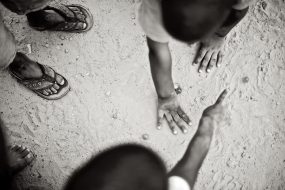Research Brief: Fewer than 1 in 10 Victims of Sexual Violence in Nigeria and Malawi Receive Services
Background

Improving sexual violence reporting is important to help victims recover from trauma. Understanding how victims report their experiences informs how to help reach and connect them with services. This study used data from the Malawi and Nigeria Violence Against Children Surveys (VACS). VACS are national, population-based household surveys that measure physical, emotional, and sexual violence against girls and boys.
Fewer than half of victims of sexual violence ever told anyone about their experience, and fewer still sought help.
| Nigeria | Malawi | |
|---|---|---|
| Reporting and help-seeking behaviors | ||
| Ever told anyone about sexual violence | 37% | 55% |
| Knew of a place to receive help | 14% | 23% |
| Ever sought help for sexual violence | 4% | 9% |
| Reasons for not telling anyone | ||
| Did not think it was a problem | 16% | 21% |
| Embarrassed for self/family | 10% | 29% |
Key Findings
- More than 1 in 4 females in Nigeria and Malawi ever experienced any sexual violence.
- About 1 in 3 victims of sexual violence in Nigeria and 1 in 2 victims in Malawi ever told anyone about their violent experiences.
- Victims who did disclose sexual violence most commonly told a friend or a neighbor in Nigeria and Malawi. Family members were the second largest group to whom females disclosed in Nigeria and Malawi.
- Victims who did not disclose said the main reasons for not telling anyone were because they were embarrassed for themselves or their families, did not think it was a problem, did not need/want to tell anyone, or were afraid of getting in trouble.
- Only about 9% of victims in Malawi ever sought help or services, and even fewer did so in Nigeria (4%).
- The most common reason for not seeking help in Nigeria and Malawi was the belief that sexual violence was not a problem.
What is added by this report?
This study provides the first examination of reporting of sexual violence by victims in two African nations with nationally representative data. The study detected high rates of sexual violence among girls and young women, yet low levels of reporting, knowledge of where to seek help, and seeking services. These findings also highlight reasons why victims of sexual violence sometimes do not tell anyone about their experiences. Without such reporting, reaching victims for services is a challenge. These findings can help efforts to develop culturally appropriate strategies to increase reporting and use of health services.
Nguyen K, Kress H, Atuchukwu V, Onotu D, Swaminathan M, Ogbanufe O, Msungama W, Summer SA. Disclosure of Sexual Violence Among Girls and Young Women Aged 13 to 24 Years: Results From the Violence Against Children Surveys in Nigeria and Malawi. Journal of Interpersonal Violence 2018; 1-17. http://journals.sagepub.com/doi/full/10.1177/0886260518757225External
Footnote: some variation between prevalence estimates from published papers and country reports may exist. This variation reflects slight differences in the subsamples and variables used in the analyses.